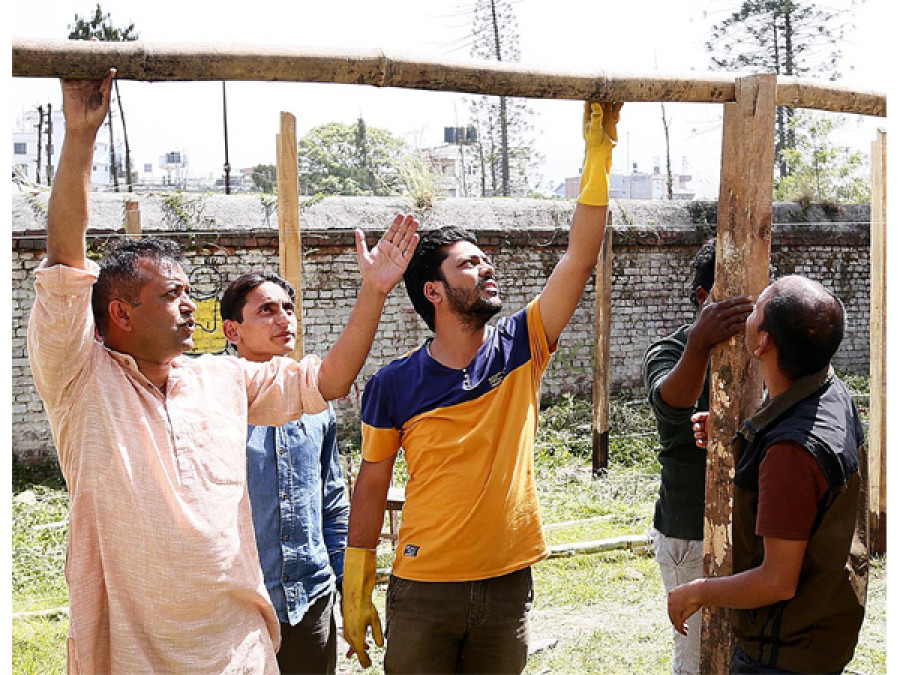Miscellaneous
Parties took a while to respond to national crisis
A month after the Great Earthquake, major political parties have finally begun to deploy their cadres to assist in relief and recovery effort.
Kamal Dev Bhattarai
At least the big parties, which have national networks, with presence both at the centre and the grassroots, should have mobilised their cadres for relief and rescue operations right after the April 25 earthquake. Prime Minister Sushil Koirala addressed the country five days after the disaster.
Political commentator Shree Krishna Aniruddha Gautam said, “All major parties have their organisations in 75 districts. After the earthquake, parties should have deployed their cadres from 60 districts to the 14 worst-affected districts. Since the political workers in 14 districts were victims themselves, they were not in a position to respond immediately. The central leadership should have ensured that cadres of unaffected districts arrived before the foreign rescue teams.”
The party headquarters of major parties remained closed for a couple of days after the earthquake and there was no plan to operate from temporary shelters, as many private offices did. Top leaders looked confused for nearly a week. “The delayed response shows that our leaders lacked the quality to rise up to the national crisis and that at a time when the people needed them the most,” said Gautam.
Humanitarian teams deployed in quake-affected districts acknowledge that it was not easy for the cadres of the most affected districts to be deployed in the rescue and relief tasks. Rajendra Man Talchadel, chief of the Sindhupalchok chapter of Nepal Red Cross Society, said party cadres and social workers themselves were hit by the earthquake in the district and it was not possible for them to move in to rescue and relief operations. “Now we are getting full cooperation from the parties in all relief, rescue and recovery tasks,” said Talchadel.
Observers say the parties failed to deploy cadres in the worst-hit Gorkha, Dhading, Sindhupalchok and Nuwakot. Though some members were deployed, they were concentrated in Kathmandu and the towns of affected districts but the parties rarely assigned them to remote villages.
The earthquake offered an opportunity for the parties to win the people’s trust and strengthen their position. But even the elected lawmakers failed to reach the worst-hit villages of their own constituency. Due to their ‘centralised’ nature, the parties paid more attention to Kathmandu and the district headquarters.
Right after the earthquake, NC, CPN-UML and UCPN (M) tried to give a message of solidarity. Both the ruling and opposition parties pledged to tackle the national crisis through consensus. However, tasks related to taking immediate decisions were delayed.
It took more than two weeks to call the House session to deliberate on issues related to the quake. A month on, the House panel has finally completed the tasks of monitoring rescue, relief and reconstruction efforts.
It took the parties three weeks after the quake to endorse a resolution directing the government to speed up tasks related to rescue, relief and rehabilitation. The dispute among the parties over the contents of the motion delayed the process. Though there was an apparent unity among the parties at the centre, the hostility among the local leaders affected relief distribution. Similarly, there were reports that political parties did not cooperate with civil servants and vice-versa. There were disputes among the parties in Kavre, Nuwakot and Sindhupalchok, among others. Chief Secretary Leela Mani Paudyal told a House Committee that the local units of the parties had obstructed relief distribution.
Lately, the government has dispatched ministers to the quake-hit areas and PM Sushil Koirala, along with top leaders of major parties, has shown some urgency to talk to officials in the hard hit districts. The UML and the Maoists have mobilised volunteers to help build shelters. The UML has said it will manage 10,000 volunteers.
The UCPN (M) has not offered any specific number but has deployed teams in the affected districts. There has been no coordination between the government and the parties about mobilising the volunteers though.
“There should be coordination between state agencies and the party volunteers. Otherwise, the problems seen in relief distribution will repeat,” said former Vice-chairman of National Planning Commission Jagadish Chandra Pokhrel. “If the government agencies did not assign them specific areas, parties may focus their work only in accessible areas and their cadres will not reach the needy rural pockets,” Pokhrel said.
After the quake, the parties have begun talks about forming a national unity government to respond effectively to the disaster. Senior leaders of the major parties, in their address in House on May 10, highlighted the need for such a government. Parties have now formally begun discussions on the formation of the national government, though no one has voiced any concrete plans. Political Analyst Krishna Khanal said parties are trying to give an impression of unity but he believes it is far from genuine. “If they genuinely want to work together to tackle the national crisis, they should not delay the unity government. Though I am in favour of such a government, I do not see the possibility of one any time soon,” said Khanal.
n




 7.12°C Kathmandu
7.12°C Kathmandu










